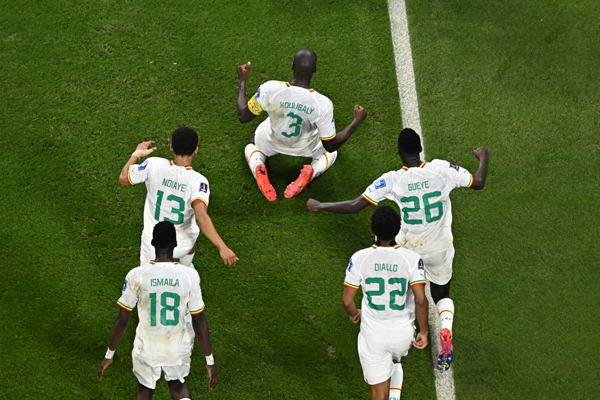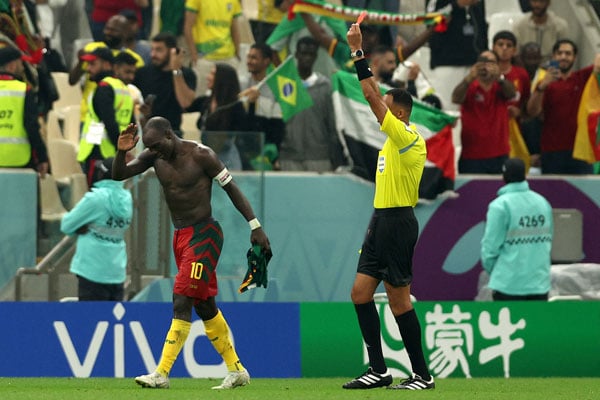Prime
Africa puts best foot forward at Qatar ’22

Senegalese players celebrate scoring their second goal against Ecuador during the Qatar 2022 World Cup Group A football match at the Khalifa International Stadium in Doha on November 29. PHOTO/AFP
What you need to know:
- The current performance also flies in the face of doomsday forecasts such as the Oxford mathematical model that didn’t envisage any African representation at the much vaunted knockout stage in Qatar.
Africa was by press time set to field two teams in the 2022 Fifa World Cup round of 16 that kicks off today with two matches. Whether or not Ghana and Cameroon made the cut on Friday, this represents a marked improvement for the continent that failed to send any of its five representatives to the knockout stage in Russia four years ago.
The current performance also flies in the face of doomsday forecasts such as the Oxford mathematical model that didn’t envisage any African representation at the much vaunted knockout stage in Qatar. Joshua Bell, a mathematical modeller from the Mathematical Institute at the University of Oxford, created a model whose route to the winds up with Brazil subjugating Belgium (the Red Devils suffered the ignominy of an early exit).
The simulation model that Bell finally settled for was one that measured the relative strength of teams. It pulled this off by using the Elo rating system that—much like it does in chess—rewards a team for beating a stronger opponent while inflicting punishment for stumbling against a weaker rival.
A recent study by Edward S. Mason from the Harvard Kennedy School spotlighted the inability of African countries to “play up” against elite nations. Mason noted that “none of the African contenders in this year’s World Cup has won five matches against elite opposition in the last five years.”
He further pointed out that Africa’s representatives are condemned to having a muted impact in Qatar since “the world champion must overcome at least five elite opponents.”
Mason appears to have insulated himself from reductionist approaches by holding—in his pre-tournament forecast—that while he “believe[s] that African countries can win the odd game against a global power”, they have evolved only negligibly in their abilities at the grandest of stages.
To ensure that results for African countries at global football’s showpiece event are not drearily routine and rare, Mason recommends that African FAs “schedule more matches against high level opponents for their A teams.”
Only then, he adds, will African countries be able to “play up” against elite Opposition and—not entirely through a fortunate stroke of serendipity—win the World Cup.
Yet as the knockout stage gets underway today, upset results—which have not been in scant supply in Qatar—have perhaps added to the feeling that anything could happen.
More than Japan (against Germany and Spain) and Tunisia’s (against defending champions France) upset wins, Senegal’s Lions of Teranga seem to be galvanised by the memory of Papa Bouba Diop who scored three of their seven goals during the 2002 Fifa World Cup.
Kalidou Koulibaly, Senegal’s captain and match winner against Ecuador, said the current unit is intent on “pay[ing] homage” to Diop who lost his battle to ALS—a neurodegenerative disease—in November of 2020. Koulibaly added that Diop “made me dream when I was a boy.”
Anticipation
Doubtless, the current Senegalese captain will inspire another generation if a round of 16 win is secured against England on Sunday night.
Morocco, the other African country to punch its ticket to the round of 16, comes up against Spain next Tuesday. The Atlas Lions’ 2-1 win over Canada on Thursday ensured that they became the only African country to win a World Cup group more than once (following their exploits at Mexico ’86)—a huge milestone by any measure.
Since being handed the coaching reins on August 31, Walid Regragui’s tactical nous has seen Morocco go five matches without conceding a goal.
Naif Aguerd’s own goal in Thursday’s conquest of Canada ended the run of consecutive clean sheets, but is not widely expected to take the wind out of the Atlas Lions’ sails.
A lot is being made out of the fact that Regragui’s charges came through a group that had titans Belgium and the 2018 beaten finalist, Croatia. The ongoing World Cup has in fact highlighted the rich rewards of a growing willingness of African FAs to have coaching duties entrusted to the care of home-bred tacticians.
Like Morocco (Regragui), Senegal (Aliou Cissé), Ghana (Otto Addo), Cameroon (Rigobert Song) and Tunisia (Jalel Kadri) will have few complaints about conferring badges of honour on their own coaches ahead of the 22nd staging of the World Cup in Qatar. All indications are that the natives haven’t disappointed.




